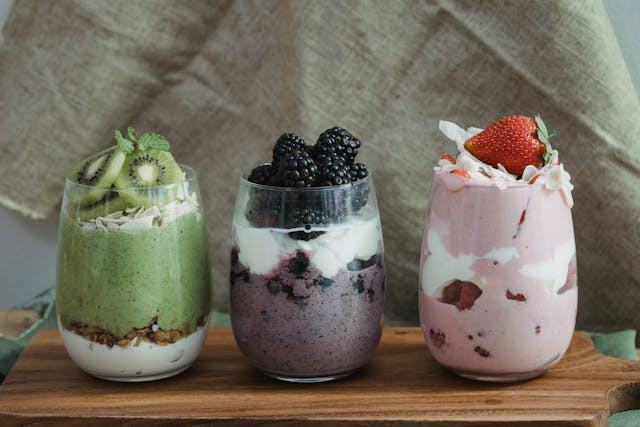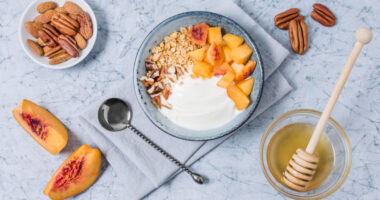Keeping your fridge stocked with wholesome foods makes meal preparation easier and supports a healthy diet. Here are 15 nutrient-rich foods that you should consider keeping in your fridge for their health benefits and versatility:
- Leafy Greens
Leafy greens like spinach, kale, and arugula contain vitamins, minerals, and antioxidants. They are versatile ingredients for salads, smoothies, and cooked dishes.
- Berries
Berries such as strawberries, blueberries, and raspberries are rich in antioxidants and low in calories. They are perfect for snacking, adding yogurt or oatmeal, or blending into smoothies.
- Greek Yogurt
Greek yogurt is an excellent source of protein and probiotics, which are beneficial for gut health. Choose plain, unsweetened varieties and use them in parfaits, dips, or as a creamy topping.

- Eggs
Eggs are a nutrient powerhouse, providing high-quality protein, vitamins, and minerals. Keep eggs in your fridge for quick and nutritious meals like omelets, frittatas, or boiled eggs for snacks.
- Lean Proteins
Store lean proteins such as chicken breast, turkey, and tofu in your fridge. They are versatile for cooking and provide essential amino acids for muscle health.
- Colorful Bell Peppers
Bell peppers are rich in vitamins C and A, antioxidants that support immune function and eye health. Use them raw in salads, stir-fries, or roasted as a side dish.
- Hummus
Hummus is a nutritious dip made from chickpeas, tahini, and olive oil. It’s high in fiber and plant-based protein, perfect for snacking with veggies or spreading on sandwiches.
- Avocados
Avocados are rich in healthy fats, fiber, and vitamins. Keep them in your fridge to add a creamy texture to salads, sandwiches, or guacamole.
- Whole Grain Bread
Opt for whole-grain bread, which is rich in fiber and nutrients. Please keep it in your fridge for quick, healthy sandwiches or toast with avocado and eggs.
- Nut Butter
Nut butter, like almond or peanut butter, provides healthy fats, protein, and fiber. Enjoy them on whole grain toast, mixed into oatmeal or as a dip for apple slices.
- Fresh Herbs
Fresh herbs like parsley, cilantro, and basil add flavor and nutrients to meals without extra calories. Please keep them in your fridge to garnish dishes or add to marinades and sauces.
- Cheese
Choose low-fat cheese options like mozzarella or feta for calcium and protein. Use cheese in moderation to add flavor to salads, sandwiches, or as a topping for omelets.
- Citrus Fruits
Citrus fruits such as oranges, lemons, and limes are rich in vitamin C and antioxidants. For refreshing snacks, salad dressings, or infused water, please keep them in your fridge.

- Unsweetened Almond Milk
Almond milk is a dairy-free alternative rich in calcium and vitamin E. It provides a creamy texture without added sugars in smoothies, cereals, or coffee.
- Tofu or Tempeh
Tofu and tempeh are plant-based sources of protein and iron. Please keep them in your fridge for stir-fries and salads, or grill and serve with veggies.
Tips for Storage and Freshness
- Proper Storage: Store foods in airtight containers or sealed bags to maintain freshness and prevent cross-contamination.
- Organize Regularly: Check your fridge for expired items and organize foods for easy access and visibility.
- Rotate Foods: To minimize waste, rotate older foods to the front and newer items to the back using a first-in, first-out approach.
Conclusion
Stocking your fridge with nutrient-dense foods ensures that you have healthy options readily available for meals and snacks. Incorporate these 15 best foods into your fridge for their nutritional benefits, versatility, and convenience. By making smart food choices and keeping your fridge well-stocked, you can support your overall health and wellness.
This blog emphasizes these foods’ nutritional value and versatility to provide practical advice for easily maintaining a healthy diet.









